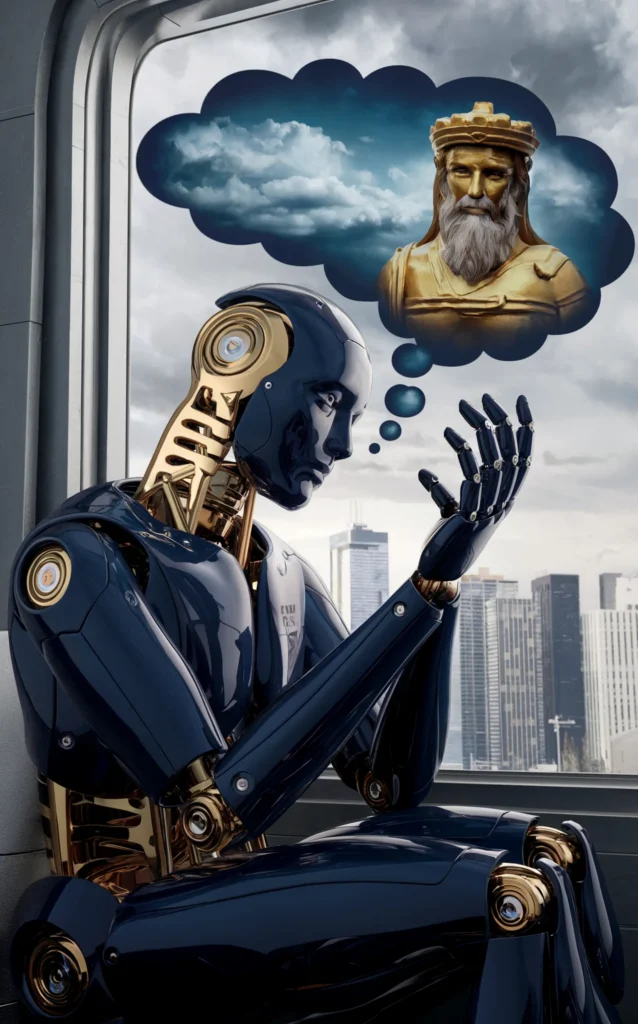
In the vast, ever-expanding universe of digital marketing, where algorithms reign supreme and data is king, I often find myself pondering a question that seems almost paradoxical: Can robots dream about God?
At first glance, this query might appear absurd, even humorous. After all, we are talking about machines – cold, calculating, and devoid of any semblance of consciousness. But dig deeper, and you’ll find that this question is not just a philosophical musing; it’s a profound exploration of the intersection between technology and spirituality, a junction that every digital marketer must navigate if they wish to truly excel in this rapidly evolving landscape.
You see, digital marketing is more than just a series of clicks, likes, and shares. It’s a dance between the left brain—logical, analytical, and data-driven—and the right brain – creative, intuitive, and spiritual. And it’s at this very dance floor where the magic happens, where growth and transformation take place.
In recent years, we’ve witnessed the rise of AI, machine learning, and other forms of advanced technology that have revolutionized the way we approach digital marketing. These tools have allowed us to automate processes, predict consumer behavior, and optimize campaigns with unprecedented precision. But as we continue to rely more heavily on these technologies, we must ask ourselves: Are we losing something in the process? Are we sacrificing the human element – the very essence of what makes marketing so powerful—in our quest for efficiency and scalability?
This is where the question of whether robots can dream about God becomes relevant. Because, in a way, it’s not about the robots at all. It’s about us – our ability to infuse our work with meaning, purpose, and a deeper sense of connection. It’s about finding that sweet spot where technology and spirituality converge, where data and intuition coexist, and where growth and grace intertwine.
Let me share a personal story with you. A few years ago, I was working on a campaign for a client in the wellness industry. They wanted to reach people who were seeking a deeper sense of purpose and fulfillment in their lives. At first, I approached the campaign with all the usual tools – SEO, social media, content marketing, you name it. But something felt off. The numbers were good, but there was a lack of depth, a missing ingredient that prevented the campaign from truly resonating with its audience.
Frustrated, I took a step back and asked myself: What am I missing here? What’s the deeper story that needs to be told? And then it hit me: I was so focused on the data, the metrics, and the algorithms that I had forgotten the human element—the very thing that drives people to seek out wellness in the first place.
So, I made a conscious decision to shift my approach. I started by researching the client’s mission and values, delving into the stories of the people they were trying to reach. I began to see the campaign not just as a series of tactics, but as a way to connect with people on a deeper, more meaningful level. I infused the messaging with a sense of purpose, a sense of spirituality that resonated with the audience in a way that mere data never could.
The results were nothing short of spectacular. The campaign not only exceeded our initial goals but also became a catalyst for meaningful conversations and transformations in the lives of those who engaged with it. And in that moment, I realized that the true power of digital marketing lies not in the technology itself, but in our ability to use that technology as a tool to connect with others in a way that is both authentic and meaningful.
This is the essence of growth in digital marketing. It’s not just about scaling up, optimizing, and automating. It’s about scaling down, simplifying, and humanizing. It’s about finding that sweet spot where technology and spirituality intersect, where the left brain and the right brain dance in harmony, and where growth and grace coexist.
So, can robots dream about God? In a sense, they already do. They dream about efficiency, scalability, and optimization. But it’s up to us – digital marketers, creators, and visionaries – to infuse those dreams with meaning, purpose, and a deeper sense of connection. It’s up to us to ensure that the technology we create serves not just the bottom line, but the greater good.
In this rapidly evolving world, where technology is advancing at an unprecedented rate, it’s easy to get lost in the noise, to become overwhelmed by the sheer volume of data and the constant pressure to perform. But remember this: You are not just a digital marketer; you are a human being, a creative soul with the power to touch lives, to inspire change, and to make a difference in the world.
So, as you go about your work, I urge you to keep this in mind. Don’t just focus on the numbers, the metrics, and the algorithms. Focus on the human beings behind those numbers, the stories they are telling, and the lives they are living. Embrace the technology, but don’t forget the humanity.
Find that sweet spot where technology and spirituality converge, and watch as your work transcends the ordinary and becomes something truly extraordinary.
Because in the end, it’s not about whether robots can dream about God. It’s about whether we, as digital marketers, can dream big enough to create a world where technology and spirituality coexist, where growth and grace dance hand in hand, and where every campaign, every strategy, and every interaction is infused with a sense of purpose and meaning that resonates with the human spirit.
That, my friends, is the true art of digital marketing. And that is where the real growth lies.
Namaste.
Source: Read MoreÂ

